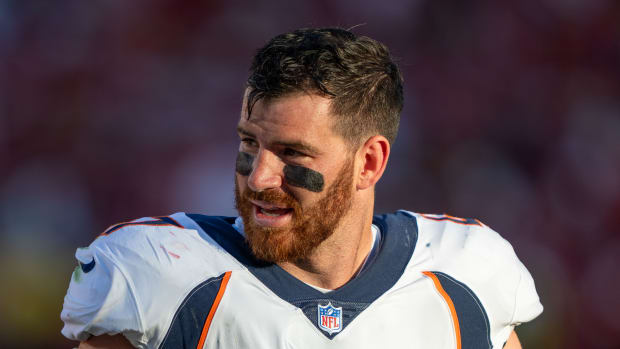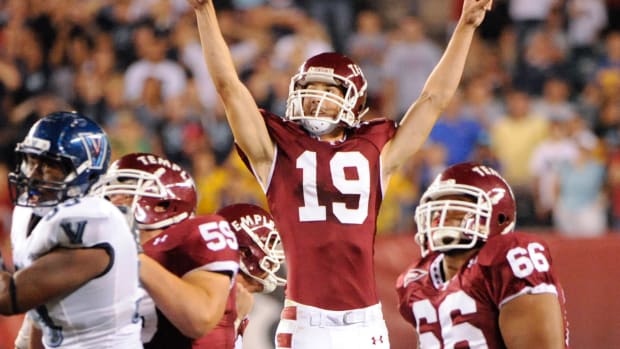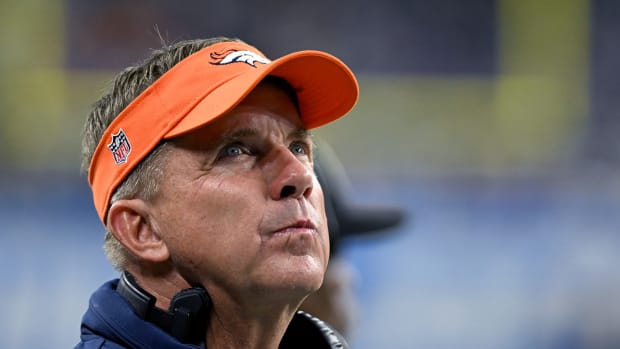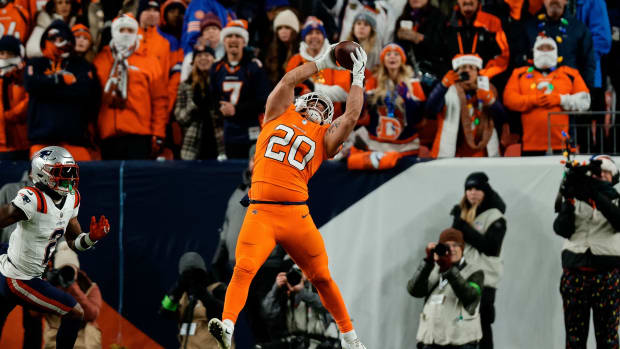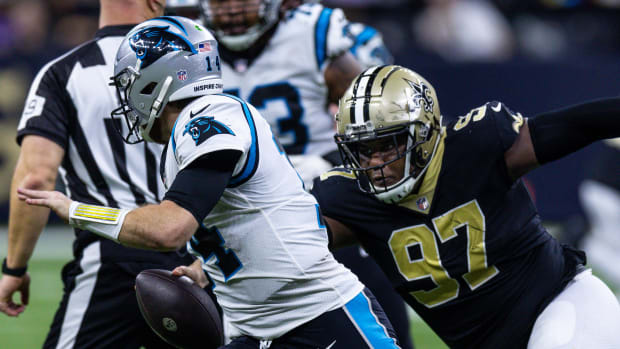If Drew Lock is to Become Broncos' Franchise QB, he'll Have to Improve This Key Metric
Drew Lock has deservedly captured the attention of Denver Broncos fans and NFL analysts. There is a tremendous amount of hope for the Broncos' new starting quarterback because of his swagger, strong arm, and the fact that he took over a flailing 3-8 team and won four of the last five games.
Players, as well as pundits, have voiced their opinion on Lock's upward trajectory. He has the 'it' factor, which is, of course, a term that is attached to quarterbacks in an effort to explain that rare ability that's difficult to pinpoint empirically.
However, there is some evidence that should temper the excitement and cause at least some level of concern on whether or not Lock is the franchise savior. That evidence is Lock’s paltry 4.7 average air yards per completed pass metric.
It placed him dead last in the NFL out of the 36 quarterbacks who attempted at least 100 passes. Furthermore, his deep-ball accuracy (any pass that traveled at least 15 yards in the air past the line of scrimmage) was 33%.
That metric was bad enough to place him 40th out of 43 qualifying quarterbacks who attempted at least 20 air-yard passes of 15 yards or greater. Finally, when calculating the difference in air yards per completion vs. yards after the catch (YAC), Lock was -0.86, putting him 34th out of 36 qualifying QBs.
Why is this concerning? Since 2009, only three rookie quarterbacks with at least 75 pass attempts had an average air yard per completion below 5.0 yards. Those quarterbacks were Jimmy Clausen, Sam Bradford, and Blake Bortles. None of those names should instill a sense of confidence for Broncos fans.
Those three also had a negative air yards to YAC ratio as did other concerning names like Colt McCoy, Blaine Gabbert, Brandon Weedon, and Brent Hundley. Does this mean that Lock is destined to be, at best, a mediocre QB? No, but it should cause some level of concern.
One could also look at the above chart and point out that Drew Brees, an elite-level QB, was only marginally better than Lock as a contrarian perspective to this entire argument. Brees' 5.3 average air yards is not impressive, but his 55% completion percentage on deep balls is.
Brees throws a ton of short, accurate passes and that works for him and the style of offense the New Orleans Saints employ. Most of the other 'elite' QBs are very near to or above 6.0 average air yards.
Reasons to Dismiss the Poor Air Yards Metric
Let’s examine some potential arguments as to why his average air yard number should be dismissed.
First, Lock played only five games and one of them was during a blizzard. That game against the Kansas City Chiefs on December 15, 2019, was his lowest 'air yard' game, but just because the snow was flying doesn’t mean that game should be excluded necessarily.
The opposing quarterback, Patrick Mahomes had is second-best 'air yard' game of the season on that day. It was more than three yards better than his average. On one hand, it's difficult to compare the performance of a rookie to an elite MVP-caliber quarterback, but on the other, if the conditions were really that much of a factor, both quarterbacks should have suffered.
Second, Lock came in late in the year and was being held back by coaches for his own protection. It makes sense when you think about it, but it probably wasn't the right approach.
The same coaching staff allowed Lock to throw as many deep passes per game as they allowed Joe Flacco, the opening-day starter. There have also been four other quarterbacks in the past two seasons who have taken the reigns from the incumbent starter during the season — Lamar Jackson, C.J. Beathard, Josh Rosen, and Baker Mayfield. They all had an average air yards per completion metric above 6.0.
Third, Lock’s preseason injury kept him from playing a full slate of preseason games and out of practices until Week 11. This particular argument has some merit. With Lock missing significant practice time, he had an uphill climb to get in-synch with his receivers.
That alone could have led to missed opportunities on deeper-thrown balls. If this were to hold true, Lock should have shown significant improvement through the five games.
He showed only a slight improvement, though. In his first two games, his average air yards per completion metric was 4.9 and in his last two games, it was 5.2. Not a shocking improvement, but an improvement nonetheless.
What it Means
There is a lot to like about Lock’s potential and these numbers do not mean he will be a terrible quarterback. In fact, one recent proxy to use as a potential indicator of what Lock’s follow up season could be is Jared Goff.
In 2016, Goff took over the reins of a mediocre L.A. Rams team in Week 11 and started the remaining seven games. His average air yards per completion metric was 5.1 as a rookie.
That number increased nearly a full yard in Goff's second season and his deep-ball accuracy increased from 34.8% to 43.8%. He guided that Rams team to an 11-4 record in his 15 games as a starter and a Wild Card entry into the playoffs.
In addition, a quarterback with a high average air yards per completion metric as a rookie doesn’t assure greatness. Some prime examples of QBs who posted high metrics in this department only to go onto NFL obscurity are Jake Locker, Geno Smith, and Jameis Winston. To say that this air yard per completion stat is the sole harbinger of what a QB's ensuing career will be would be a foolish statement.
However, this concerning metric should cause some pause in anointing a quarterback 'elite' without at least seeing what a sophomore season brings. Lock will have to show significant improvement in Year 2 to warrant a franchise QB label.
The good news is, he's making all the right moves for that improvement to come to fruition. He's led impromptu practices with his receivers amid the pandemic, picked the brain of one of the best quarterbacks of all time, and put in the work that it takes to be an elite QB. Lock's future looks bright, but the optimism should come with a healthy amount of caution.
If Lock's sophomore season looks similar to his rookie campaign in these stat categories, that's when fans should really worry. If he shows marked improvement, fans can breathe a sigh of relief and truly hope that the Broncos have found their franchise QB.
Follow Thomas on Twitter @ThomasHallNFL and @MileHighHuddle.

